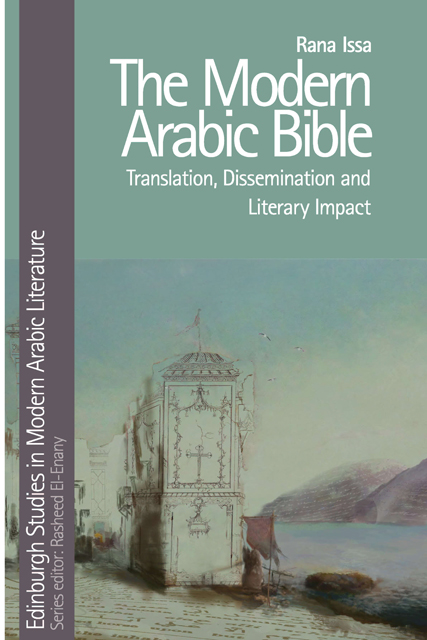Book contents
- Frontmatter
- Contents
- List of Figures
- Series Editor’s Foreword
- Acknowledgements
- Note on Transliteration and Abbreviations
- Dedication
- Introduction
- 1 The Missionary Bible
- 2 Bible Competition
- 3 Standardising Arabic
- 4 Butrus al-Bustani as Translator
- 5 Ahmad Faris Al-Shidyaq’s Bible as Literature
- Conclusion: In the Beginning was Translation
- Bibliography
- Index
4 - Butrus al-Bustani as Translator
Published online by Cambridge University Press: 02 June 2023
- Frontmatter
- Contents
- List of Figures
- Series Editor’s Foreword
- Acknowledgements
- Note on Transliteration and Abbreviations
- Dedication
- Introduction
- 1 The Missionary Bible
- 2 Bible Competition
- 3 Standardising Arabic
- 4 Butrus al-Bustani as Translator
- 5 Ahmad Faris Al-Shidyaq’s Bible as Literature
- Conclusion: In the Beginning was Translation
- Bibliography
- Index
Summary
The death of Eli Smith in 1857 disentangled Butrus al-Bustani from his engagements with the Syria mission, and his career as a Bible translator came to an end. Two years before Smith’s death, this friend and mentor had left him a long letter explaining why his candidacy for the position of minister of the evangelical church in Beirut had been rejected. As Smith writes, al-Bustani had acquired a ‘secular rather than spiritual’ reputation, as a ‘man of great intelligence’, whose skills and contribution to the secular betterment of the people can be seen in his dedication to ‘secular business whichever be of the literary kind that would leave for the pastorate a divided mind and heart which would certainly stand in the way of success’. Fearing that al-Bustani may become too distracted by his literary pursuits from the work of the ministry, Smith might have triggered al-Bustani’s release from the burden of spiritual responsibilities that he was carrying throughout his employment with the missionaries. Under no legal obligation to honour his contract upon the death of one of the signatory parties, al-Bustani left the Bible unfinished, in the care of Cornelius Van Dyck, his friend and colleague, who would carry out the task of the full translation of the continuous text mostly alone, aided only by the Muslim sheikh Yusuf al-Asir, as copy-editor. Al-Bustani went on to build a literary legacy that he envisioned as part of modernising Arab society and a propellor for its progress. This legacy included newspapers, lexicons and literary translations. In all these endeavours, translation was the primary tool that was deployed for the production of texts.
This chapter presents al-Bustani as a translator. By starting it with the point of release from biblical labour, I reveal how the interruption in al-Bustani’s trajectory was overcome through turning to the Bible and to translation as the root and method that anchored his secular endeavours. Al-Bustani’s later work, I argue, embodies one of the great paradoxes of modernity, in how he decided to base his secular thinking on religious thought. The secular inversion, as I show, represses the extent to which the modernity he advocated for was based on religious assumptions.
- Type
- Chapter
- Information
- The Modern Arabic BibleTranslation, Dissemination and Literary Impact, pp. 149 - 187Publisher: Edinburgh University PressPrint publication year: 2023

